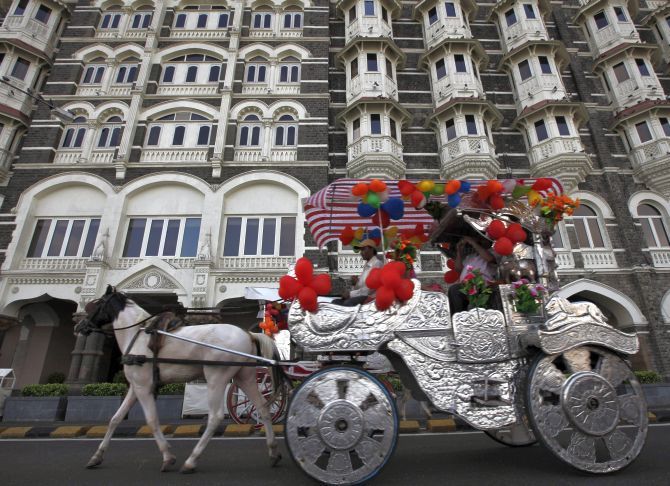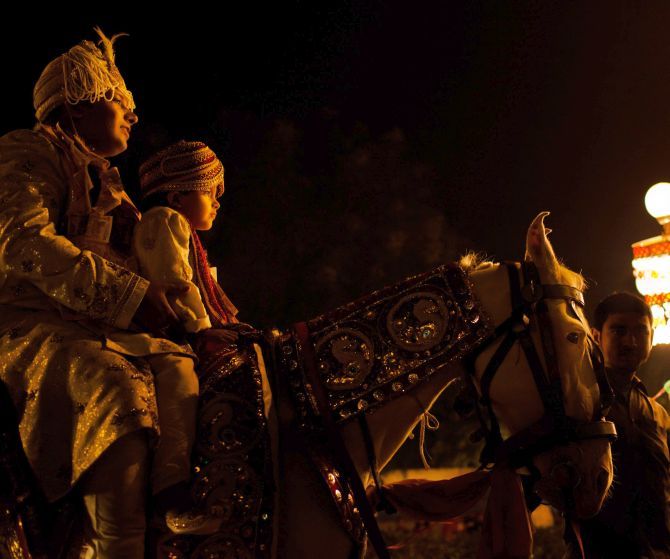Families who used to make a living out of driving the famed ‘Victorias’ in Mumbai struggle to make ends meet.

It is over a year since Mumbai’s iconic horse-driven carriages, famed as Victorias, have been banned by the Bombay high court, holding their operation as cruelty to animals.
But scores of families who used to make a living out of the buggies are yet to be rehabilitated, despite reminders to the government by the court.
The decorated Victoria carriages, with the rhythmic trots of the horses that pull them, were a familiar sight on the roads of South Mumbai for the last few centuries.
In June 2015, the high court directed the Brihanmumbai Municipal Corporation to put a complete stop on them within a year, while holding that they violated rules under Prevention of Cruelty to Animals Act.
The court also directed the state government to work out a policy to rehabilitate the carriage owners and coachmen affected by the ban and also the horses.
The order was given on a PIL by city-based NGO Animals and Birds Charitable Trust, contending that the joyride caused cruelty to horses.
About a month ago, the high court slammed the government over the slow pace of rehabilitation of the affected people and directed it to speed up its efforts.
The government then sought some more time to frame the rehabilitation policy. It said the committee set up for the purpose had so far identified 221 people as affected by the ban.
Taking a generous approach, the high court last week said the government could consider framing a new policy or rules to permit plying of horse carriages for joyrides with proper care of the horses.
“We are taking a slight departure from the high court’s judgment. You (government and city civic body) need not stop it (horse carriages) altogether. It can be still used as joyrides for entertainment purposes and for tourist attraction,” the court said.
“But then the authorities will have to carry out regular inspection to see that the horses are taken care of, are well fed and given adequate rest,” the HC said.

With no other way to make both the ends meet, some of the coachmen still take the Victoria carriages out for ride, taking the risk of running into law-enforcers.
As per the information obtained by animal rights NGO PETA from the office of Mumbai’s joint commissioner of police (traffic), the licences issued for the 130 horse-drawn carriages in 2011 and 2012 had expired by 2013.
“Not only the plying of the Victoria buggies runs the risk of contempt of court but it also involves violation of The Bombay Public Conveyances Act, 1920, and the Motor Vehicles Act, 1988, besides endangering the health and safety of horses and the general public,” PETA India’s director of veterinary affairs Dr Manilal Valliyat said.
But the families hit by the ban have their own woes to narrate.
“It was like exploding a bomb on our head. We have lost our means to earn a living,” said coachman Ganpat Mokal.
Several generations of Mokal’s family had been in the carriage business since the days of the British rule and they still have six horses, being used for wedding processions.
The cash-strapped Mokal family, living in suburban Vikhroli, said they still look after the horses like their children, ensuring that they would not suffer for want of fodder or care.
“Wedding processions are not an everyday affair. So we have to ply the horses to feed them. We cannot think of starving them to death. We need at least Rs 300 to 400 to feed the horses a day,” the 65-year-old coachman said.
Mokal said they would prefer their business back and are ready to meet any conditions that the court or petitioners put forward for the proper upkeep of horses.
Since the horse owners and their handlers have not brought their operations to a complete halt, several cases of seizure of carriages by law-enforcers have been reported over the months.

Valliyat said since July 2016 nine ailing horses have been seized from the roads of Mumbai by police and Animal Welfare Board of India’s authorised inspectors.
“They were malnourished and suffering from severe dehydration, painful arthritis, cracked hooves and multiple fresh wounds,” he said.
“Many of these horses did not have shoes, which caused their soles to be worn down, predisposing them to painful foot conditions such as inflammation of the sensitive membrane inside the hoof,” Valliyat said.
A 38-year-old horse owner said it was unbearable for him to see his horses starving because he could not feed them.
Pointing at his horses near Nariman Point, he said, “Yes, I do ply my horses in Bhendi Bazar, Byculla and nearby areas... only to feed them. Do you know, there are at least seven dependents on each horse. The ban has put us in misery. They catch our horse and take it away. I have lost my two horses, nearly two lakh rupees.”
Meeru Mittal of the NGO Animals and Birds Charitable Trust, the petitioner in the case, said the government and the BMC should act fast on the rehabilitation of the people hit by the ban.
“The Bombay high court ordered in our favour, because it found our plea right on several grounds. Now the buck stops with the BMC. Besides, the state government also has to do the needful for the rehabilitation of these poor people,” she added.











 © 2025
© 2025